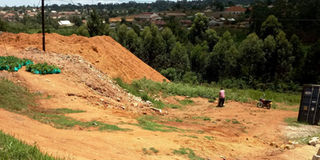Authorities struggle to restore wetlands in Masaka

Degraded. A section of Nakayiba Swamp in Nyendo Town, Masaka District, which a private developer has filled with murrum in preparation for construction of permanent structures. Most wetlands in the area are encroached for human activities. PHOTO BY IVAN KIMBOWA.
What you need to know:
- Monitor toured at least three major wetlands of Kajjansembe, Kassooka, and Ssenya on Thursday and ongoing human activity visibly threatens the wetlands.
Masaka City authorities are struggling to restore degraded wetlands in the area, leaders have said.
Some of the degraded wetlands include Kajjansembe, Kassooka and Ssenya in Kimaanya-Kabonera Municipality that have been turned into gardens.
These three depleted wetlands pour into the Nabajjuzi wetland system, which serves as the primary water source for Masaka city and neighboring villages. Other encroachers are using the marshlands for bricklaying, clay and sand mining.
In February, Environment Minister Sam Cheptoris instructed the city administration to eject all encroachers to completely restore the wetlands.
However, the ministerial directive has not been enforced.
Mr Isaac Semba, who uses part of the Ssenya wetland commercial agriculture told this publication that the city enforcement team only evicted a few encroachers who were cultivating near the main road.
“After that, several people created pathways deep into the wetlands and continued,” he told Monitor on Thursday.
At the beginning of the FY2022/2023 in July, Masaka City Clerk Godfrey Bemanyisa told Journalists that they had restored Kassooka wetland as per the minister's instructions and that majority of the city's other depleted wetlands are currently undergoing restoration.
But Monitor toured at least three major wetlands of Kajjansembe, Kassooka, and Ssenya on Thursday and ongoing human activity visibly threatens the wetlands.
Biodiversity Conservation Foundation (BCF) spokesperson Prossy Kabanda accused the city environment enforcement officers of soliciting money from encroachers to illegally continue occupying the wetlands.
“Our survey indicates that farmers and other encroachers pay between Shs50, 000 and Shs100,000 to enforcement officers.This is unacceptable and must top ,” she claimed.
The Masaka City senior environment officer Ms Pauline Nabadda denied the allegations and maintained that they are restoring the depleted wetlands with farmers now told to vacate immediately after harvesting.
“Wetland restoration is a process and most encroachers at Kassooka were evicted. We are sensitising more encroachers to leave as we plan more restoration in this rainy season,” she said.
At least three farmers who have plantations in the wetlands denied receiving any notice to vacate the wetland.
Ramsar City
Masaka City is endowed with streams and many wetlands-two of which are recognized as of international importance (Ramsar sites). These are Nabajjuzi wetland system and Lake Nabagabo ecosystem. Recently, Masaka was tipped to become Ramsar city but ongoing destruction of the marshlands may affect that ambition.





